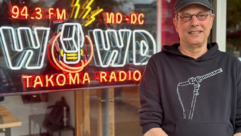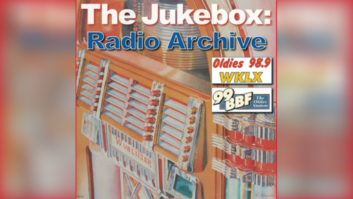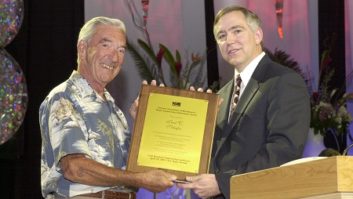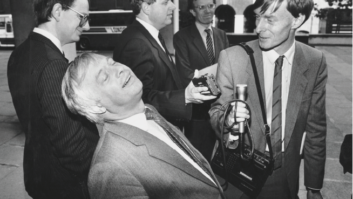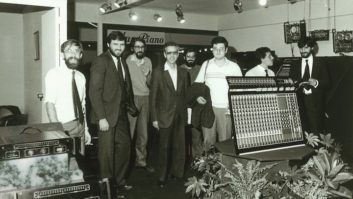FORT LEE, N.J. After nine years, the saga of a New Jersey radio broadcaster who drew the attention of the FCC and broadcasters to questions about local program origination on translators is over.
Gerard Turro’s two translators, W276AQ(FM) in Fort Lee, N.J., and W232AL(FM) in Pomona, N.Y., no longer retransmit the programming of WJUX(FM) in Monticello, N.Y.
“The FCC directed Mr. Turro to cease the arrangement to come into compliance with FCC translator rules,” said Turro’s attorney, Charles Naftalin. “The FCC asked that he stop the retransmission of WJUX’ programming and he did by severing his relationship with WJUX.”
Turro declined comment for this story through Naftalin, who would not speculate on Turro’s broadcasting plans.
The two translators are rebroadcasting other content. The Fort Lee translator at 103.1 MHz in Bergen County has been retransmitting oldies from WKHL(FM) in Stamford, Conn., since at least the first of the year.
Turro’s unorthodox operation included the origination of programming from a studio in Dumont, N.J., feeding the audio via telephone line to WJUX more than 100 miles away. He recaptured the audio at the 2.5-watt Pomona translator, which in turn was received by a Sony car stereo at the 34.5-watt Fort Lee translator site. The programming was then retransmitted on 103.1.
Critics of Turro’s arrangement said he was using a back-door approach to reach listeners in the lucrative New York City and northern New Jersey market.
Bending the rules?
Complaints by Universal Broadcasting of New York, which owns Bergen County’s only full-power radio station, WVNJ(AM) in Oakland, N.J., led to an FCC investigation into whether Turro was skirting commission rules regulating translators, which bar operators from directly producing programming for translators.
Turro asked the FCC in 1991 if an FM translator could purchase air time on the primary FM station it rebroadcasts. The FCC at the time gave the go-ahead for the project in a letter, Naftalin said.
Turro launched “Jukebox Radio” and its middle-of-the-road format in 1993. Turro and Wesley Weis, owner of Monticello Mountaintop Broadcasting Inc., licensee of WJUX, entered into a Network Affiliation Agreement, or time-brokerage arrangement, whereby Turro leased virtually the entire schedule of WJUX.
In 1996 the FCC said any financial agreement between persons owning translators and primary stations was improper. However, Naftalin said the FCC allowed Turro’s arrangement with WJUX to remain in place until the case was resolved.
“The whole issue of compliance with the programming or carriage part of the translator rules was an unresolved issue that had been hanging around for seven years,” Naftalin said.
In addition, the FCC held hearings in 2000 to address the issue of whether Turro lacked candor or misrepresented his use of the translators to the FCC, Naftalin said.
The FCC also examined the relationship between Turro and Weis, and whether WJUX complied with main-studio rules governing origination of programming.
Weis rented space from WVOS(AM-FM) in Liberty, N.Y., and hired several of its staffers to work for WJUX. The FCC concluded that Turro and Weis acted truthfully in their dealings with the commission.
“The FCC ruled in Turro’s favor and that is why he remains a licensee in good standing,” Naftalin said.
In early 2002 the commission ordered Turro to sell either the translators or the studio to distance himself from the licensee of WJUX. Naftalin said Turro sold the Dumont studio to his business manager, Graciella MacLeod. However, the FCC remained unsatisfied with the relationship.
Loan paper trail
In a Nov. 18, 2002, letter to Turro, the FCC wrote, “Turro personally paid off the substantial loan amount for the FM 103 studio and retained all documentation of the FM 103 loan. In contrast, (MacLeod) had no involvement in the repayment of the loan and no documentation.
“A personal loan guaranty by an individual establishes a prohibited connection with the borrower. Repayment of the loan by an individual also establishes a prohibited connection with the borrower, ” the agency stated staff in the letter.
The letter concluded by terminating Turro’s temporary authority to rebroadcast WJUX for noncompliance, effective 10 days from the date of the letter.
FCC Audio Division Chief Peter Doyle said FCC rules governing the use of translators are straightforward.
“The rule says (there can be) no connection between a primary station and a translator if it is outside of the primary station’s coverage area. In this case, we found continuing connections between the sides. There were numerous ways Turro could have avoided this, by either selling the translator or terminating the affiliation agreement. (Turro) failed to act until we threatened to cease his operation,” Doyle said.
Doyle said it was a “unique case” with many factors involved, which is why the case took nearly 10 years to settle.
“This often happens when we do not receive sufficient information to make decisions … things are not wrapped up in a timely matter. In retrospect, the advice they received early on was contrary to FCC guidance. It was a long and protracted process, but we were only interested in upholding the FCC’s broadcast standards,” Doyle said.
Naftalin said a proposed sale of the two translators to Press Broadcasting Inc. in Trenton in 1999 never materialized.
“With the delay in the sale because of the FCC hearings … both parties amicably walked away from the deal,” Naftalin said.
Turro has said in the past that he considered Jukebox a success. “We served the community, generated revenue, gave people jobs and paid taxes,” he said.




